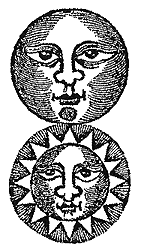
|
The Sun-Eating Dragon
Eclipse Stories, Myths, and Legends
By Noel Wanner
The light of day begins
to fade in the middle of the morning. Looking up, you catch a glimpse
of what looks like a disk of pure blackness sliding across the face
of the sun. Soon the blackness has almost completely covered the
sun, and dusk is falling over the land. The air cools. The birds
are silent and still. What do you feel as the light drops away?
Is an eclipse frightening? Beautiful? Or both at once?
Eclipses appear
often in the mythology and literature of different
 cultures and different ages, most often as symbols of obliteration,
fear, and the overthrow of the natural order of things. The word
eclipse
comes from a Greek word meaning "abandonment."
Quite literally, an eclipse was seen as the sun abandoning the earth.
cultures and different ages, most often as symbols of obliteration,
fear, and the overthrow of the natural order of things. The word
eclipse
comes from a Greek word meaning "abandonment."
Quite literally, an eclipse was seen as the sun abandoning the earth.
A recurring
and pervasive embodiment of the eclipse was a dragon, or a demon,
who devours the sun. The ancient Chinese would produce great noise
and commotion during an eclipse, banging on pots and drums to frighten
away the dragon. The Incas, too, tried to intimidate the creatures
who were eating the sun. In India they took a different tack —
people would immerse themselves up to the neck in water, an act
of worship they believed helped the sun fight off the dragon.
As astrophysicist
David Dearborn notes, "In many ways it makes sense that eclipses
would be seen as bad omens. For most early cultures, the sun was
seen as a life-giver, something that was there every day, so something
that blots out the sun was a terribly bad event, filled with foreboding."
Milton, in
Paradise Lost
, captures the unease eclipses generated
in early Europeans:
|
|
As
when the Sun, new risen,
Looks through the horizontal misty air,
Shorn of his beams,or from behind the Moon,
In dim eclipse, disastrous twilight sheds
On half the nations, and with fear of change
Perplexes monarchs.
|
Science Steps
In
As a mechanistic,
scientific view of the universe grew in influence, the image of
the eclipse began to shift. The new view reflected the empirical
approach to the world and rejected awe and terror, emotions that
came to be seen as a sign of an undeveloped, uncivilized mind. William
Wordsworth's "The Eclipse of the Sun, 1820," describes
the contrast between the attitudes of British scientists in India
and the Indians as the eclipse begins:
|
|
High
on her speculative tower
Stood Science waiting for the hour
When Sol was destined to endure
That darkening of his radiant face
Which Superstition strove to chase,
Erewhile, with rites impure.
|
|

